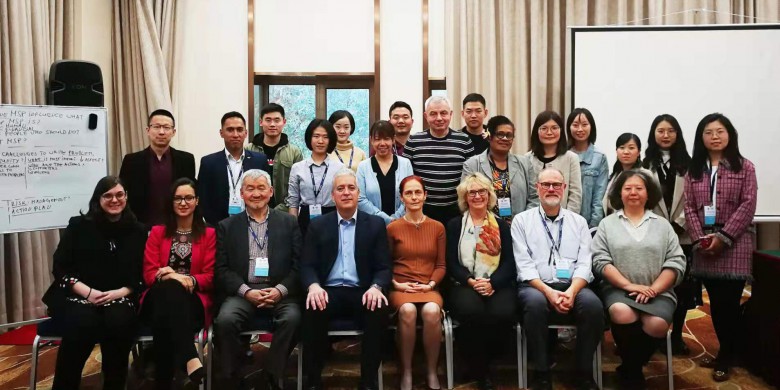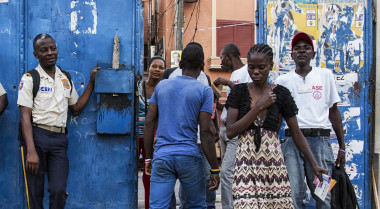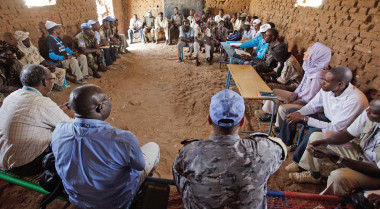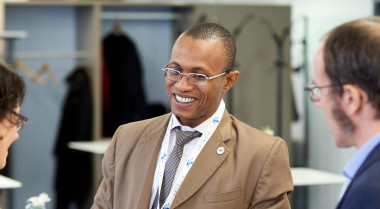
Training of Trainers for Peacebuilding in Beijing, China
The annual Training of Trainers for Peacebuilding Skills, organised by GPPAC's Improving Practice Working Group, was recently held for the first time in Northeast Asia. Hosted by the Charhar Institute in Beijing with cooperation of GPPAC Northeast Asia’s Regional Secretariat, Peace Boat, this training comprised of several days of valuable learning exchanges, capacity building trainings and a public seminar discussing conflict and reconciliation in different regions.
Working Group members from Fiji, Georgia, Palestine, the Philippines, Serbia and the United States came together with regional network members from China, Japan, Korea and Mongolia for a rich exchange of experiences and practices in peacebuilding, training and facilitation. Aims of the week included for participants to become trainers who can train colleagues and peers in the field, and increase the capacities and practices within the GPPAC network; to share experiences with peers at a learning exchange with civil society members in the region of Northeast Asia; to work with GPPAC’s Multi-Stakeholder Processes Manual and gender inclusivity as key topics of the training; and to build the role and the skills of a trainer (and of dialogue facilitator).
GPPAC members shared experiences, highlighting the importance of horizontal multistakeholder processes, inclusivity and utilising GPPAC as a platform for continued engagement.
Opening the week’s programmes on November 4, Charhar Institute Secretary General He Zhigeng shared his vision for the collaboration to deepen further, and for Charhar as a non-governmental think tank to become more active in conflict prevention and peacebuilding through personnel exchanges, reports and public activities, which would in turn contribute to their efforts to promote development of public diplomacy and contribute to regional stability. These words of welcome were followed by a comprehensive presentation by Ambassador Ma Keqing, former Deputy Director-General of the European Department of the Ministry of Foreign Affairs (MFA), sharing her views of China’s role in the field of peace and security, and the importance of multilateralism - “seeing ourselves as all travelling in the same boat.” During the active exchange which followed, GPPAC members shared experiences from the Middle East, Southeast Asia, the Pacific and Northeast Asia, highlighting the importance of horizontal multistakeholder processes, inclusivity and utilising GPPAC as a platform for continued engagement.
This active discussion was continued the following day on November 5, through a public seminar with the participation of various local civil society organisations, academic experts, representatives from the diplomatic community and the media, to discuss GPPAC members’ experience in so-called conflict “hot spots” and practices for peacebuilding. Here, working group members from the Caucasus, Western Balkans and Northeast Asia likewise shared their experiences from their activities on the ground.

The week’s events in Beijing finished with a one day intensive Training of Trainers. Facilitated by GPPAC Working Group members, the training was attended by a diverse range of participants including representatives of civil society organisations such as the American Friends’ Service Committee (AFSC) and the Chinese People’s Association for Peace and Disarmament (CPAPD), students of the China Peacekeeping Police Training Center, and academics from the China Foreign Affairs University and China Women’s University. The day’s training was based on GPPAC’s Multi-stakeholder Processes manual, and featured transfer of key knowledge, sharing of practical experiences, and interactive exercises, led by trainers Jon Rudy, Tanja Popovic, Lucy Nusseibeh and Gabriella Vogelaar.
The first of its kind to be held in Northeast Asia, this training was a rich experience for all. The GPPAC Improving Practice Working Group will continue to collaborate with regional members in Northeast Asia and globally, to provide opportunities for training in the wide range of resources and toolkits developed by the network, and to mutually work to enhance the peacebuilding and conflict prevention work being implemented by members around the world.


